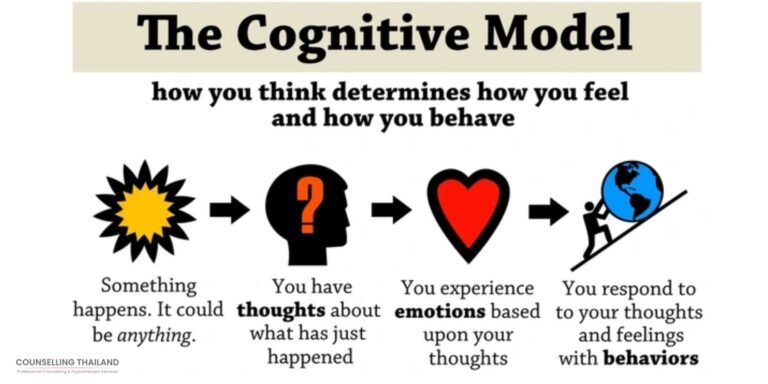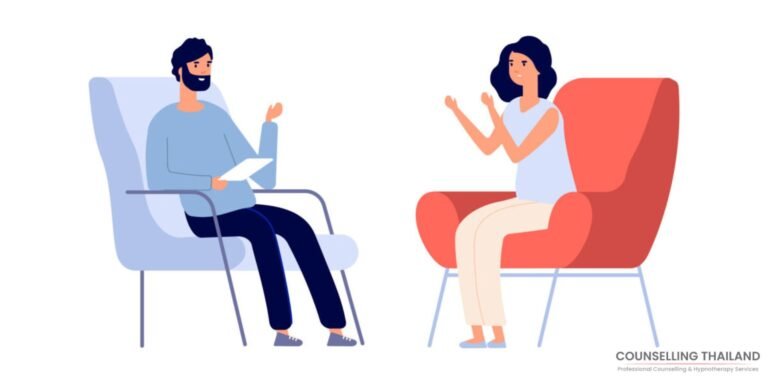CBT Therapy
CBT Therapy with Counselling Thailand
CBT Therapy, short for Cognitive Behavioural Therapy, is a widely recognised, evidence-based approach utilised by Counselling Thailand to help people create meaningful change in how they think and feel. Practised around the world for more than 50 years, CBT is based on a simple yet powerful idea: it’s not the events themselves that shape our emotions, but how we interpret and respond to them.
This structured but adaptable form of therapy helps individuals recognise unhelpful thinking patterns and develop more constructive, balanced perspectives. Each session focuses on identifying specific challenges, setting achievable goals, and learning practical techniques that can be applied in daily life.
Unlike open-ended or purely exploratory counselling, CBT Therapy is typically goal-focused and time-limited, offering clear direction without losing personal flexibility. It is effective for concerns such as anxiety, stress, and low mood, and it equips people with long-term tools to manage future difficulties more confidently.
By exploring the relationship between thoughts, feelings, and behaviours, CBT encourages greater self-awareness, emotional balance, and resilience — helping clients build a healthier, more adaptive approach to life’s challenges.
How Does CBT Work?
CBT Therapy helps break complex challenges into smaller, more manageable parts. These are often explored in four connected areas:
- Thoughts: What goes through your mind in certain situations.
- Emotions: How those thoughts influence your feelings.
- Behaviours: How you act or respond.
- Physical reactions: What happens in your body (e.g., tension, racing heart).
By examining these areas together, clients begin to see how they are linked. For instance, someone with public-speaking anxiety might think “I’ll embarrass myself,” which leads to fear, avoidance, and physical symptoms such as sweating or shaking. Through implementing CBT, they learn to challenge this thought — perhaps reframing it as “I’ve spoken successfully before” or “I may feel nervous, but I can still do well.” Over time, practising these new ways of thinking and behaving helps reduce anxiety and build confidence.

This diagram highlights the three-way interaction at the core of CBT Therapy. Thoughts influence feelings, feelings influence behaviours, and behaviours in turn influence thoughts, creating either a helpful or unhelpful cycle.
CBT Therapy is also collaborative. Rather than being a passive process, the client and counsellor work together to set goals and try out new strategies. Homework tasks, such as keeping thought diaries or experimenting with different behaviours, play a vital role. These exercises help reinforce learning and allow progress to continue between sessions.
Research highlights this practical approach. A review by the UK’s National Institute for Health and Care Excellence (NICE) recognises CBT Therapy as one of the most effective forms of structured counselling, particularly for anxiety and depression.

What Issues Can CBT Therapy Help With?
Cognitive Behavioural Therapy is versatile, and this is one reason why it has become so widely used across the world.
Emotional concerns: CBT Therapy is especially effective for anxiety disorders, depression, panic attacks, phobias, and obsessive thoughts. It helps clients learn how to reduce cycles of fear or sadness and regain a sense of balance.
Trauma responses: Many individuals who have lived through distressing or overwhelming experiences, whether recent or long past, may also benefit greatly from CBT Therapy. Traumatic memories can leave lasting emotional and physical imprints, often showing up as anxiety, hypervigilance, intrusive thoughts, or avoidance of certain people, places, or situations.
While CBT cannot erase painful memories, it offers practical ways to reduce their ongoing emotional impact. Through gentle exploration and structured techniques, clients learn to identify trauma-related triggers, understand how their thoughts and bodily reactions interact, and gradually re-establish a sense of safety and control.
For those who have experienced deep or long-term trauma, CBT can also complement other approaches such as Trauma Counselling and PTSD Therapy, providing a stabilising framework for recovery.
Daily challenges: In our experience, CBT Therapy isn’t only for people experiencing anxiety, depression, or trauma; it is equally effective for navigating the everyday challenges of life. Many people use CBT to manage stress, low confidence, low self-esteem, communication struggles, sleep problems, or difficulty adjusting to change, whether that means moving to a new country, starting a new job, or coping with relationship transitions.
Because CBT is practical and solution-focused, it helps individuals recognise unhelpful thought patterns before they grow into deeper emotional struggles. Couples and families also find CBT techniques valuable for improving communication and breaking repetitive patterns that create tension or misunderstanding.
Workplace and academic concerns: CBT Therapy can be especially helpful in addressing the pressures that come with work and study. Students and professionals alike often face performance anxiety, perfectionism, procrastination, or self-doubt, which can interfere with focus, motivation, and overall wellbeing.
CBT also supports skills like time management, assertive communication, and setting healthy boundaries, making it an effective approach for managing workplace stress, academic pressure, and burnout prevention. Its adaptability allows it to benefit people from all walks of life, from students preparing for exams to professionals striving for a healthier work-life balance.
Benefits of Choosing CBT Therapy
Choosing CBT Therapy offers several distinct benefits:
- Practical strategies: Clients leave sessions with exercises they can apply immediately, whether breathing techniques for anxiety or thought-challenging tools for self-doubt.
- Short-term focus: While some therapies may continue indefinitely, CBT Therapy is often designed to be short to medium-term. Many people experience noticeable improvement within 6 to 20 sessions.
- Skill-building: CBT Therapy focuses on developing lifelong coping and problem-solving skills. Clients learn practical tools to manage stress, regulate emotions, and respond to future challenges with greater confidence and balance.
- Evidence-based results: Multiple studies confirm CBT’s effectiveness. For instance, a study in Thailand published in Frontiers in Neurology titled “Effectiveness of internet-based CBT-I for the treatment of chronic subthreshold to moderate insomnia” found CBT Therapy to be one of the most thoroughly researched and consistently effective forms of counselling across multiple concerns.
Clients often describe CBT Therapy as a “toolbox for life” — something they can rely on long after therapy ends

CBT Therapy vs Other Types of Therapy
It is natural to wonder how CBT Therapy compares to other approaches. While some forms of counselling explore childhood experiences and unconscious processes, CBT Therapy tends to focus on the present and the practical.
That does not mean it ignores the past — rather, the emphasis is on how past experiences influence current patterns of thinking and behaviour. For example, someone who grew up with critical parents may now have an internal voice that is harshly self-critical. CBT Therapy helps them recognise and challenge that voice, learning more balanced ways of self-evaluation.
Clients who appreciate structure and clear steps often find CBT Therapy appealing. In our experience, it is particularly suitable for those seeking measurable goals, homework activities, and visible progress within weeks or months.
Complementary Modalities That Work Well with CBT Therapy
CBT Therapy is an effective form of therapy and can be used in isolation, but more effectively when coupled with other modalities such as Dialectical Behavioural Therapy (DBT), Acceptance and Commitment Therapy (ACT) & Rational Emotive Behaviour Therapy (REBT).
At Counselling Thailand, our team also works with other approaches that align well with CBT. For example, Dialectical Behaviour Therapy (DBT) adds a focus on emotional regulation and mindfulness skills, while Acceptance and Commitment Therapy (ACT) emphasises values-based living and psychological flexibility. Similarly, Rational Emotive Behaviour Therapy (REBT) shares CBT’s emphasis on thoughts but places particular focus on core beliefs and philosophical outlooks. These modalities can be integrated in parallel with CBT Therapy, offering clients a tailored and holistic approach that adapts to individual needs.
Experienced CBT Therapists at Counselling Thailand
Finding the right therapist is one of the most important steps in beginning any form of therapy. The relationship you build, grounded in trust, comfort, and understanding, plays a vital role in how supported and effective the process feels.
At Counselling Thailand, our experienced CBT therapists in Chiang Mai, Bangkok and online work with individuals, couples, families, children, teens, and adolescents. Many have provided counselling within international schools, corporate wellbeing programmes, and community projects across Thailand. Beyond professional expertise, our therapists bring compassion, cultural understanding, and a genuine commitment to helping clients make meaningful change.
When choosing a therapist, it can help to consider:
- Comfort and connection – feeling heard, understood, and respected.
- Communication style — some clients prefer a structured, goal-oriented approach; others value warmth and reflection.
- Language and culture — sessions should feel natural, whether conducted in English, Thai, or one of our many other languages, including Vietnamese, Mandarin, Indonesian, Korean and Hindi.
- Experience and specialisation — for example, working with trauma, anxiety, relationships, couples, families, or child and adolescent issues.
Recommendations for our counsellors and therapists can often be found through personal recommendations, online reviews (Bangkok & Online) or client testimonials (Chiang Mai). However, we understand the importance of privacy and confidentiality in the therapy process. Therefore, many individuals prefer to remain anonymous and avoid publicly disclosing that they are seeing a counsellor or therapist.
Our experienced team helps match each client with a therapist whose style and expertise align with their needs and preferences. We believe it’s important that you feel comfortable and confident with your therapist from the very beginning. That’s why, like most reputable counselling and therapy providers, we offer a free initial consultation. This gives a chance to talk things through, ask any questions, and see whether the connection feels right before making any commitment.

Getting Started with CBT Therapy at Counselling Thailand
Taking the first step towards counselling can feel daunting, but at Counselling Thailand, we aim to make the process simple and supportive.
The journey usually begins with an initial consultation. Here, you can discuss your goals, ask questions, and decide whether CBT Therapy feels right for you. Together with your counsellor, you will then create a plan tailored to your needs.
Sessions may include a mixture of conversation, exercises, and practical homework. For example, if you struggle with insomnia, your counsellor might guide you through a sleep diary and introduce techniques to manage racing thoughts at night. If stress is your concern, relaxation strategies such as progressive muscle relaxation may be introduced.
Depending on your location, we offer both in person and online sessions, allowing flexibility for those living abroad, travelling frequently, or seeking support in the comfort of their own home. You can view our current fees by visiting our Fees and Appointments Page.
As previously mentioned, we encourage all clients to complete our online enquiry form and then book a free initial consultation call before making any commitment.
Frequently Asked Questions
- What is CBT (Cognitive Behavioural Therapy) and is it effective?
A. CBT is a structured form of counselling that focuses on the connection between thoughts, emotions, and behaviours. Decades of research confirm its effectiveness across a wide range of concerns. - How does it work?
A. It helps people notice unhelpful thinking patterns and challenges them. By practising new perspectives and behaviours, clients develop healthier ways of coping. - What’s the theory behind it?
A. CBT is based on the cognitive model, which suggests that our thoughts influence how we feel and act. By changing our thoughts, we can change our emotional and behavioural responses. - What does research say?
A. Research is extensive. Studies published in journals such as The Lancet Psychiatry and Journal of Consulting and Clinical Psychology consistently show CBT’s effectiveness for anxiety, depression, and trauma-related issues. - What issues can CBT help with?
A. Anxiety, depression, obsessive behaviours, trauma responses, relationship issues, stress, habits, and sleep problems are among the many areas where CBT has proven useful. - How long does CBT usually take?
A. It varies. Some people see progress in 6 sessions, while others continue for 12–20 sessions. The focus is usually short to medium-term. - Can CBT be done online?
A. Yes. Remote CBT via video calls is widely used and shown to be just as effective for many clients as in-person sessions.
Ready to Begin Your CBT Therapy Journey?
CBT Therapy offers a structured, evidence-based, and practical approach to personal growth and emotional wellbeing. Whether you are dealing with anxiety, seeking ways to manage stress, or simply wanting to develop healthier patterns of thinking, Cognitive Behavioural Therapy provides tools that make a genuine difference.
At Counselling Thailand, our experienced team is here to support you — whether online or in person. By taking this step, you are investing in skills that can benefit you for years to come.
How to Get Started with a Free Initial Consultation
At Counselling Thailand, we understand the importance of finding the right therapist for addressing your concerns and needs. That’s why we offer a free initial 15 minute consultation for individuals and 30 minutes for couples and families before booking your first therapy appointment.
First, complete our online client enquiry form. This will give a little extra information to help us select whom we believe the most suitable therapist would be and then we can email you a list of available appointment times for the free initial call.
During this consultation, we will discuss your specific situation and determine whether our approach aligns with your needs. We will also answer any questions you may have. If you decide to proceed with counselling, we can then schedule the first full session(s) at a mutually convenient time.
If you have any questions before booking the free initial call you can either visit our Frequently Asked Questions Page, or mention these whilst completing the online enquiry form.




